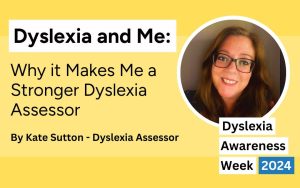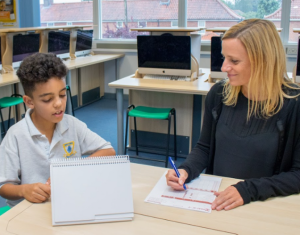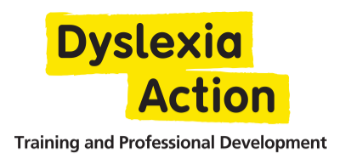Dyslexia and Me: Why it Makes Me a Stronger Dyslexia Assessor
Imogen Barber
 Article by Kate Sutton – Dyslexia Assessor and tutor for Dyslexia Action
Article by Kate Sutton – Dyslexia Assessor and tutor for Dyslexia Action
When you hear about someone working as a dyslexia assessor, you might picture someone who’s a master of language, with a mind like a dictionary and a perfect sense of grammar.
But what if that assessor is dyslexic too? At first, it might sound ironic – like someone with a fear of heights becoming a skydiving instructor. However, being dyslexic while working as a dyslexia assessor is not just possible; it’s a superpower.
For someone without dyslexia, understanding what it’s like to struggle with reading or writing is difficult. They can observe it, learn about it, and teach strategies to manage it – but they’ll never fully know the frustration of letters flipping around on a page or words that refuse to come together. This is where dyslexic assessors shine.
Lived experience
 When you’ve been there and faced the challenges yourself, you bring a level of empathy that’s unmatched. You don’t just see dyslexia from an outside perspective; you feel it. You know how discouraging it can be to feel different or to struggle with tasks that seem easy for others. It’s this shared experience that helps clients feel more comfortable, more understood, and less anxious during the assessment process.
When you’ve been there and faced the challenges yourself, you bring a level of empathy that’s unmatched. You don’t just see dyslexia from an outside perspective; you feel it. You know how discouraging it can be to feel different or to struggle with tasks that seem easy for others. It’s this shared experience that helps clients feel more comfortable, more understood, and less anxious during the assessment process.
Living with dyslexia means that you’ve spent a lifetime developing strategies to cope with it. Dyslexic assessors often have a treasure trove of practical, real-life tips that can help their clients – because they’ve tested these strategies themselves.
Whether it’s using text-to-speech software, creating visual aids, or figuring out how to break down complex tasks, dyslexic assessors have found solutions that work in everyday situations. This gives them a practical edge when recommending accommodations or learning techniques to clients. Instead of offering theoretical advice, they can say, “Here’s what worked for me, and it might help you too.”
As a parent of a dyslexic child, I often give first-hand recommendations and accounts of what has worked for myself and my son. He was assessed at age eight, having had significant difficulties with literacy. The decision to pay for a private assessment was difficult but very worthwhile. At the time, I was a secondary school teacher with little experience of what dyslexia was. We were able to see from the recommendations in the report what was needed. That weekend we bought a computer, and encouraged him to type as much as possible and to start using a computer for purposes other than gaming!
We hired a specialist tutor to work with him weekly and made sure that the school was on board with following relevant recommendations such as overlearning opportunities, extra time for tasks, multisensory teaching where possible and working on memory skills. All the support worked. In his English SAT reading paper he gained a standardised score of 119; an amazing score for a boy who three years prior was not able to read or write basic words.
The strategies I share come from experience, not just textbooks, and that personal touch often makes all the difference for individuals who are struggling to find ways to manage their dyslexia.
Empowerment
 Unfortunately, there are still many misconceptions about dyslexia. Some people believe it’s a sign of low intelligence or that individuals with dyslexia can’t succeed in academic or professional environments. As a dyslexic assessor, you become living proof that these stereotypes are false.
Unfortunately, there are still many misconceptions about dyslexia. Some people believe it’s a sign of low intelligence or that individuals with dyslexia can’t succeed in academic or professional environments. As a dyslexic assessor, you become living proof that these stereotypes are false.
Your career serves as a powerful example that people with dyslexia are more than capable of achieving success. In fact, many individuals with dyslexia are highly creative thinkers, excellent problem solvers, and are great at seeing the bigger picture – skills that are incredibly valuable in various fields, including education and assessment.
By leading by example, you show clients (especially younger ones) that their dyslexia is not a roadblock to success. It’s simply a different way of learning and thinking, and it doesn’t define their potential. This message of empowerment can be life-changing for someone struggling with their identity as a learner.
Outside the box
When traditional methods of learning or working don’t align with your brain’s wiring, you’re forced to think outside the box. This extends to the role of an assessor as well.
Dyslexic assessors can think creatively about how to adapt assessments, accommodate different learning preferences, and come up with unique solutions for clients. This flexibility makes assessments more individualised and can lead to more personalised recommendations that truly address the client’s specific needs.
Clients, especially children, may come to an assessment feeling nervous or even ashamed of their struggles with reading, writing, or schoolwork. They might feel like they’re the only one facing these challenges or that they’ll never be able to succeed. When they learn that their assessor also has dyslexia, it can be a powerful moment of connection and relief.
Knowing that the person evaluating them has faced the same struggles builds trust. They see someone who understands their difficulties from the inside out and who has found ways to thrive despite those challenges. This makes clients more likely to open up, share their experiences, and participate fully in the assessment process.
Superpower

Perhaps the greatest advantage of being a dyslexic assessor is the ability to reframe dyslexia not as a deficit, but as a different way of processing information. Dyslexic assessors know first hand that while dyslexia presents certain challenges, it also brings unique strengths, like out-of-the-box thinking, creativity, and problem-solving skills.
This perspective allows assessors to focus not only on the difficulties their clients face but also their strengths. They can help clients see that their dyslexia doesn’t make them less capable, but simply different – and that difference can be a source of power. By helping them understand their unique abilities, dyslexic assessors can foster confidence and resilience.
In the world of dyslexia assessment, personal experience is an incredible asset. Dyslexic assessors bring empathy, practical knowledge, creativity, and a deep understanding of what it’s like to navigate the world with a learning difference. They not only assess dyslexia – they live it, which makes them uniquely qualified to help others on the same journey.
About Kate Sutton
After graduating from Sheffield University with a degree in Creative Music Technology, Kate went on to teach secondary ICT, swiftly working her way up to the senior management team.
She was offered a position as a Teacher Advisor by her Local Authority in a multi-million-pound City Learning Centre with specialism in performance, technology, and music. During this time, she provided courses for local communities and schools (reception to 18 years) as well as CPD for teachers, aiming to raise awareness of the use of new technologies to enhance learning. Moving to Wigan, she went back into schools to work in senior leadership, taking on responsibilities for safeguarding, and supporting children with EAL, and later the SENCO role.
Kate was not aware that she had dyslexia or dyspraxia until she was formally assessed while studying for her MA in Dyslexia at Edge Hill, on the recommendation of her tutor. Her diagnosis had a profound effect, especially as Kate’s son had only just been diagnosed with dyslexia and dyspraxia earlier previous year. She received extra support alongside access to assistive technology. It was a life-changing moment, for Kate, and one that prompted a decision to train to be a dyslexia specialist and assessor, in order to help support others.
In 2024, Kate became a tutor with Dyslexia Action and an APC reviewer with The Dyslexia Guild. She is also a full-time senior lecturer and course leader of the Dyslexia and Dyscalculia courses at Edge Hill. Kate also runs her own small business completing assessments and specialist teaching.
Have you been inspired by Kate’s story?
Take a look at our video: How to become a dyslexia assessor to find out more about routes into assessment.



